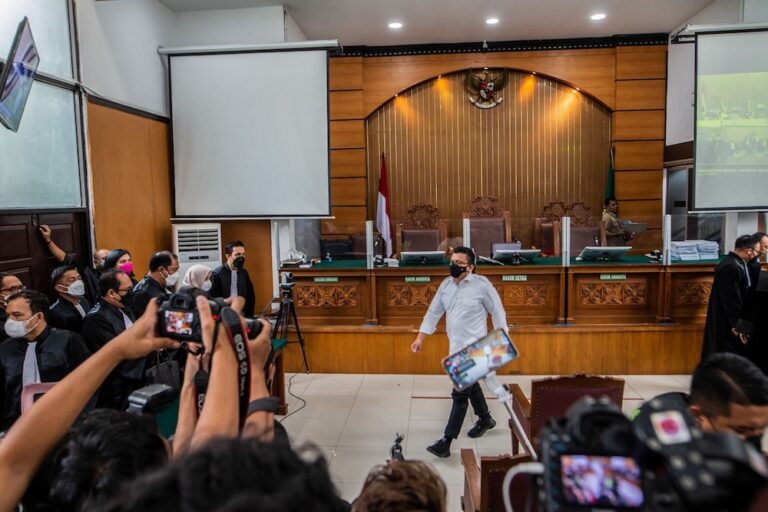(AJI/IFEX) – On Friday, 30 January, South Sulawesi Regional Police forwarded its investigation documents regarding the case of Upi Asmaradhana to the local Attorney General Office. Upi-coordinator of the Journalists Against Press Criminalization-was charged for defaming the former chief of the South Sulawesi Regional Police, Inspector General Sisno Adiwinoto. The case against Upi stemmed from […]
(AJI/IFEX) – On Friday, 30 January, South Sulawesi Regional Police forwarded its investigation documents regarding the case of Upi Asmaradhana to the local Attorney General Office.
Upi-coordinator of the Journalists Against Press Criminalization-was charged for defaming the former chief of the South Sulawesi Regional Police, Inspector General Sisno Adiwinoto.
The case against Upi stemmed from his protest action against a statement issued by Inspector General Sisno. The police official said that in dealing with complaints against the press, mechanisms stipulated in the Press Law could be waived. The South Sulawesi Regional Office filed criminal charges against Upi for his protest action.
In a democratic country like Indonesia today, differences of opinion should be resolved through dialogues instead of imprisonment. Those who disagree with Upi’s opinion, including Inspector General Sisno, should counter with rational arguments. Instead, Inspector General Sisno responded by filing criminal defamation charges. This created a chilling effect to public dialogues and worse, it represented an abuse of power because Inspector General Sisno was then chief of the South Sulawesi Regional Police when he had filed the suit.
Moreover, defamation should be considered a civil matter instead of a criminal one. Many members of the international community have revoked their criminal defamation provisions from their penal codes and treat defamation as a civil case instead. As a result, fewer and fewer states sanction defamation. Criminalising defamation will only impair freedom of expression – a human right protected by the Constitution.
History has shown that criminal defamation was first used to curb the public’s critical voices. In the past, Indonesia’s Dutch colonial officials enacted criminal defamation provisions to repress Indonesia’s freedom fighters. The Netherlands itself revoked criminal defamation from its body of laws hundreds of years ago.
In a democratic state, civil instead of criminal defamation strikes a balance between freedom of expression and the right to privacy of individuals. Defamation is a private matter and not a public one. Freedom of expression, on the other hand, is a human right guaranteed by law.
Defamation should be treated as a civil matter. Conflicting parties should be provided with plenty of opportunities for mediation and peaceful resolution. Financial sanction instead of imprisonment should be the legal consequence for defamation.
Unfortunately, we now witness the criminal defamation charges against Upi Asmaradhana, a former Metro TV Makassar correspondent. The Alliance of Independent Journalists (AJI) Indonesia Office expressed its disappointment on the police’s criminal action against Upi Asmaradhana. AJI Indonesia protests this decision by stating the following:
1. AJI Indonesia calls for all law enforcers, including police officers and the attorney generals, to use their right for “deponeering” or discontinuation of the case against Upi Asmaradhana in order to protect the greater public interest of freedom of expression – a human right and constitutional right, as well. According to the Indonesian Penal Proceeding Code (Kitab Undang-Undang Hukum Acara Pidana/KUHAP), law enforcers have the right for “deponeering” due to a number of reasons; one of them is public interest. Freedom of expression and freedom of the press should be regarded as public interests that should be protected, not threatened by criminal defamation provisions.
2. AJI Indonesia calls for Inspector General Sisno Adiwinoto to revoke his charge on the case and choose mediation instead. Mediation will bring win-win solutions to both parties, particularly to Inspector General Sisno. Criminalising this case on the other hand, will not lead to a speedy solution.
3. AJI Indonesia calls for the National Police to monitor this case in order to avoid abuse of power. This case should be handled by a neutral party free from any vested interests.
4. AJI Indonesia calls for all parties not to curb freedom of expression and to develop a robust public discussion instead. Public discussion is an important element of democracy and should not be undermined.
Updates the Upi case: http://ifex.org/en/content/view/full/98473/


